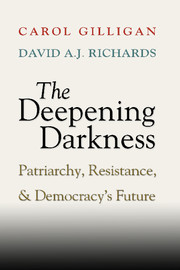Book contents
- Frontmatter
- Contents
- Acknowledgments
- Introduction and Overview
- Part One Roman Patriarchy: Entering the Darkness
- Part Two Resistance Across Time and Culture
- 6 Resistance: Religion
- 7 Resistance: Psychology
- 8 Resistance: The Artists
- 9 Resistance: Politics
- Part Three Democracy's Future
- Conclusion
- Notes
- Bibliography
- Index
8 - Resistance: The Artists
Published online by Cambridge University Press: 01 September 2010
- Frontmatter
- Contents
- Acknowledgments
- Introduction and Overview
- Part One Roman Patriarchy: Entering the Darkness
- Part Two Resistance Across Time and Culture
- 6 Resistance: Religion
- 7 Resistance: Psychology
- 8 Resistance: The Artists
- 9 Resistance: Politics
- Part Three Democracy's Future
- Conclusion
- Notes
- Bibliography
- Index
Summary
WHY ART?
As the darkness Vergil made visible in singing of arms and the man swept across Europe during World War I, artists, and in particular novelists, took up the problem of resistance. Paul Fussell's now classic study The Great War and Modern Memory marks the experience of the soldiers as a turning point in the literary imagination of manhood and war, expressed in the quotation from A Farewell to Arms that we use as an epigraph to this book: “Abstract words such as glory, honor, courage, or hallow were obscene beside the concrete names of villages, the numbers of roads, the names of rivers, the numbers of regiments and dates.” What to Vergil was an understory had become the story.
In the immediate aftermath of the war, five novelists zeroed in on the psychology and culture of manhood and womanhood that had sustained and justified its slaughter. In different ways, they exemplify the power of art and associative methods to undo the dissociations of patriarchy, taking us into an underworld of feeling and thought about which we often cannot speak. Since patriarchy rests on a suppression of voice and a rewriting of history, artists can perform the vital function of speaking the truth and shifting the framework. And if we are right about Vergil and Apuleius, resistance to patriarchy (the love stories of Dido and Aeneas and Cupid and Psyche) is what rivets us in their works, in part because such resistance is so deeply rooted in our psyches.
- Type
- Chapter
- Information
- The Deepening DarknessPatriarchy, Resistance, and Democracy's Future, pp. 198 - 224Publisher: Cambridge University PressPrint publication year: 2008



